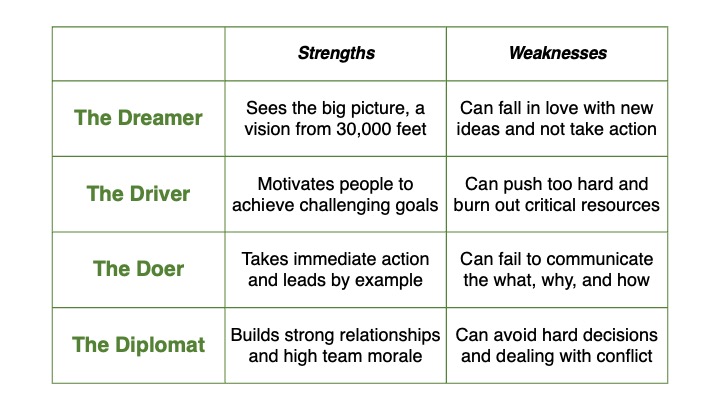There are dreamers. There are drivers. There are doers. And there are diplomats.
What kind of leader are you?
Idle curiosity shouldn’t move you to answer this question, like a silly Facebook survey. (If you were a rock, what kind of rock would you be? Who cares!)
Answer this question because your leadership style determines your default response in crisis, like the COVID-19 crisis we faced or the international turmoil and economic uncertainty that’s all around us. Your style’s strengths can provide direction to the organization you serve and help lead them out of the mess we’re in, and your weaknesses, if unaddressed, could make an even bigger mess. Hence the words: fatal flaw.
Leaders come in all shapes and sizes, with unique quirks that make up their individual personalities. After decades of working with business executives, however, I’ve noticed four over-arching styles that fuel their approach to people and circumstances—the dreamer, the driver, the doer, and the diplomat.
So, again, what kind of leader are you? Let’s find out.
The Dreamer
Dreamers look at the big picture. They instinctively see the world from 30,000 feet. They lead with a bright vision for the future, complete with inspiring words and evocative imagery.
Most dreamers are a geyser of innovative ideas, coming up with ten before breakfast and ten more before lunch. Dreamers can go on and on for hours about these ideas, and herein lies the problem.
“Ideas are like rabbits. You get a couple and learn how to handle them, and pretty soon you have a dozen,” John Steinbeck famously quipped. Anyone who’s had their garden taken over by rabbits can feel his pain.
Too many ideas and too little action, if any action at all: that’s the fatal flaw of the dreamer. Even worse, the energy a new idea gives a dreamer can be mistaken for action, when all that’s going on is a rush of adrenaline.
What’s a dreamer to do?
Focus
Pick one or two of your best ideas and see them through to completion. Refuse to let your organization’s resources be stretched an inch deep and a mile wide. Lead like a laser, an inch wide and a mile (or two or three miles) deep.
Dream … yes! We need your outside-of-the-box thinking now more than ever. But make sure your dreams get done. Only action alters reality.
The Driver
Drivers direct others. They have a gift for mobilizing people in the service of the mission. They charge forward and challenge others to do the same, together achieving amazing outcomes.
Drivers push. And push and push and push, like my Orangetheory coach who always got me to give a little bit more in a workout session. And I loved her for it! But sometimes a driver can push too hard, injuring both the people and the organization being served.
What’s a driver to do?
Listen
I’m a driver, and this has been my fatal flaw—not listening to others. At times I’ve pushed so hard that I’ve burned out vital resources, including myself.
The instinct of drivers to keep moving forward is good. But that instinct needs moderation, a pacing that’s in tune with the needs of people.
When I realized listening didn’t make me a weaker leader but a stronger one, a lightbulb came on for me. A listening leader is fully informed about the situation at hand and ready for any contingency. In learning how to listen, I came to see that waiting for the right time in doing anything is wise, and driving, like a hammer, is not the right tool for every situation.
The Doer
Doers lead by example. They let their actions do the talking, not their words. They’re like a platoon sergeant running into battle out in front of the troops. They assume the rest will follow in line.
But more often than not, the rest don’t follow in line. Not because they’re lazy or cowardly, but because the cause and the course of action are not clear. And this lack of clarity results in confusion and, ironically, inaction.
Doers assume way too much; that’s their fatal flaw. Doers believe others know exactly what they need to do when in fact they may not. Doers also assume that others know exactly why they should do what they need to do, which may be more of a mystery than the what. In short, doers expect others to get it without much of an explanation (if any at all).
What’s a doer to do?
Delegate
Please note, however, that delegate doesn’t mean dump, as in, “I’ve been doing this, now you do it!” Delegation involves communication, detailed communication of a step-by-step process that takes a person from beginner to expert.
Delegation takes time. That’s the rub for most doers, because it usually takes less time to just do something themselves. Fine, if you’re an individual contributor (maybe), but a leader’s job is to increase organizational capacity, and that doesn’t happen when one person does everything.
To my dear doer friends, don’t stop being the leader you are. It’s great! But your actions need words to duplicate them, because, unfortunately, we can’t read your minds. Take the needed time to hand off all that you’re doing to others. We’re waiting.

The Diplomat
Diplomats build relationships.
They assert, and rightly so, that everything that gets done within an organization, ultimately gets done by people. So diplomats focus on people. Words like connection, chemistry, and collaboration flow from their lips, as they invest their time in building teams and maintaining morale.
The fatal flaw of a diplomat, however, is keeping the peace at all costs. They can fail to make a difficult decision because it might upset others and strain relationships. Diplomats tend to avoid conflict at all costs.
What’s diplomat to do?
Lean In
Ironically, it’s the diplomat with their strong people skills who can be most effective in conflict. People trust them and feel deeply connected to them, so they’re willing to receive bad news from them as well.
Diplomats need to remember that it’s kind to be clear and cruel to let a team member make the same mistakes over and over again without receiving any correction, ruining their career.
So lean in. Speak up. Give honest feedback with all the grace and charm that comes so naturally to you.
If you’re a dreamer, dream. But focus your efforts on a vital few priorities so that your dreams get done.
If you’re a driver, push. We need you to motivate us to be the best version of ourselves. But don’t push too hard. Listen and learn from the people you lead.
If you’re a doer, do. Lead by example, but explain what you’re doing (and why) so we have what we need to join you in your journey.
And if you’re a diplomat, keep caring for people the way you do, but remember that those people also need to hear the truth from you, even if it hurts.


